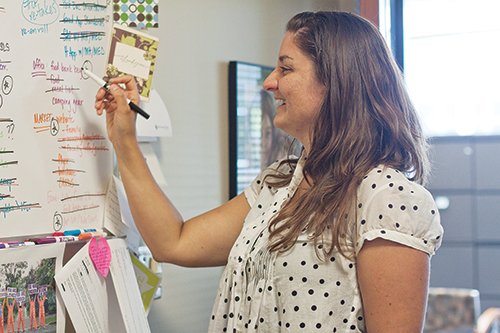Each year, many students are faced with mental health challenges. Whether it’s a recurring bout of bipolar disorder or schizophrenia or a first-time response to a new stressor, an episode can make it very difficult to cope with the stress of both school and life.
Students facing mental health episodes have options

Each year, many students are faced with mental health challenges. Whether it’s a recurring bout of bipolar disorder or schizophrenia or a first-time response to a new stressor, an episode can make it very difficult to cope with the stress of both school and life.
Portland State’s Disability Resource Center is trying to make life a little easier for those students.
Taking advantage of both the Americans with Disabilities Act and a burgeoning social movement to help the disabled, whether their disabilities are physical or psychological, the DRC now attends to the needs of roughly 800 students.
Led by Director Jen Dugger, the DRC talks with professors, mental health professionals, community service providers and others to arrange accommodations for students struggling in their classes.
Duggar said that it was all a matter of “eliminating barriers” to help students succeed.
While some students come to the DRC on their own, Duggar said that most referrals come via the dean of student life’s CARE Team.
Gina Senarighi, an assistant dean in charge of the program, receives her referrals from students and faculty members who notice a sudden change of behavior in their peers or students.
To ensure that these referrals are informed and objective, Senarighi also organizes presentations and workshops with faculty.
“It’s important for [students and faculty] to recognize certain signs,” Senarighi said. She also emphasized the importance of not attempting an amateur diagnosis.
“[There is] tricky territory with bias and discrimination,” she added.
Once a student is referred to the CARE Team, they receive an email from Senarighi to inform them of some of the services that may be helpful. Even if the problem is unrelated to a diagnosable mental health episode (Senarighi referred to the students she serves as ‘distressed’), other PSU programs, such as Student Legal Services, may be able to help.
If the student does not wish to pursue these avenues, the discussion ends there. Mandatory treatment, Senarighi said, simply does not work.
However, if a student does choose to pursue accommodations through the DRC, they can either make an appointment or walk into the office on the first floor of Smith Memorial Student Union during drop-in hours, which are 11 a.m. to 1 p.m. Monday through Friday. Meetings last an average of 15 minutes, but can go longer if needed.
To receive accommodations, a student must have some form of documentation from a mental health professional. This usually takes the form of a formal diagnosis. If a student comes into the DRC already equipped with this and their accommodations do not alter what Duggar calls “the fundamental learning outcomes” of a class, it is possible for the process to take less than a day.
As director of counseling services at the Center for Student Health and Counseling, Marcy Hunt is often the one to step in to help students who feel that they may not be neurotypical. While SHAC’s rigorous attention deficit hyperactive disorder testing is the most commonly requested service, Hunt offers help to any student whose mental activity “interferes with work or their ability to go to class.”
Once diagnosed, the range of reasonable accommodations available to students is nearly limitless. For those with trouble taking notes, audio recording devices, early access to PowerPoint presentations and note-takers can be provided. For those who struggle with testing, extended times and altered testing formats may be available.
Beyond this somewhat familiar range of services, though, are other options. Service animals may be allowed in classrooms to provide emotional support for those suffering from post-traumatic stress disorder; students dealing with depression may be allowed some degree of attendance flexibility; and an increasing number of adaptive technologies are becoming available for other issues previously beyond the reach of the DRC.
Duggar said behind all of this is an attempt to replace the medical model of disability, which treats disabilities as a personal problem to be overcome, with a social model, which asks why disabled people are confronted with so many challenges.
For Senarighi, it is a matter of compassion.
“We never want students to go through hard things alone,” she said.






Now if only the academic review committee (who hears academic appeals) understood a bit more of how mental illness works we may have some real change going on!